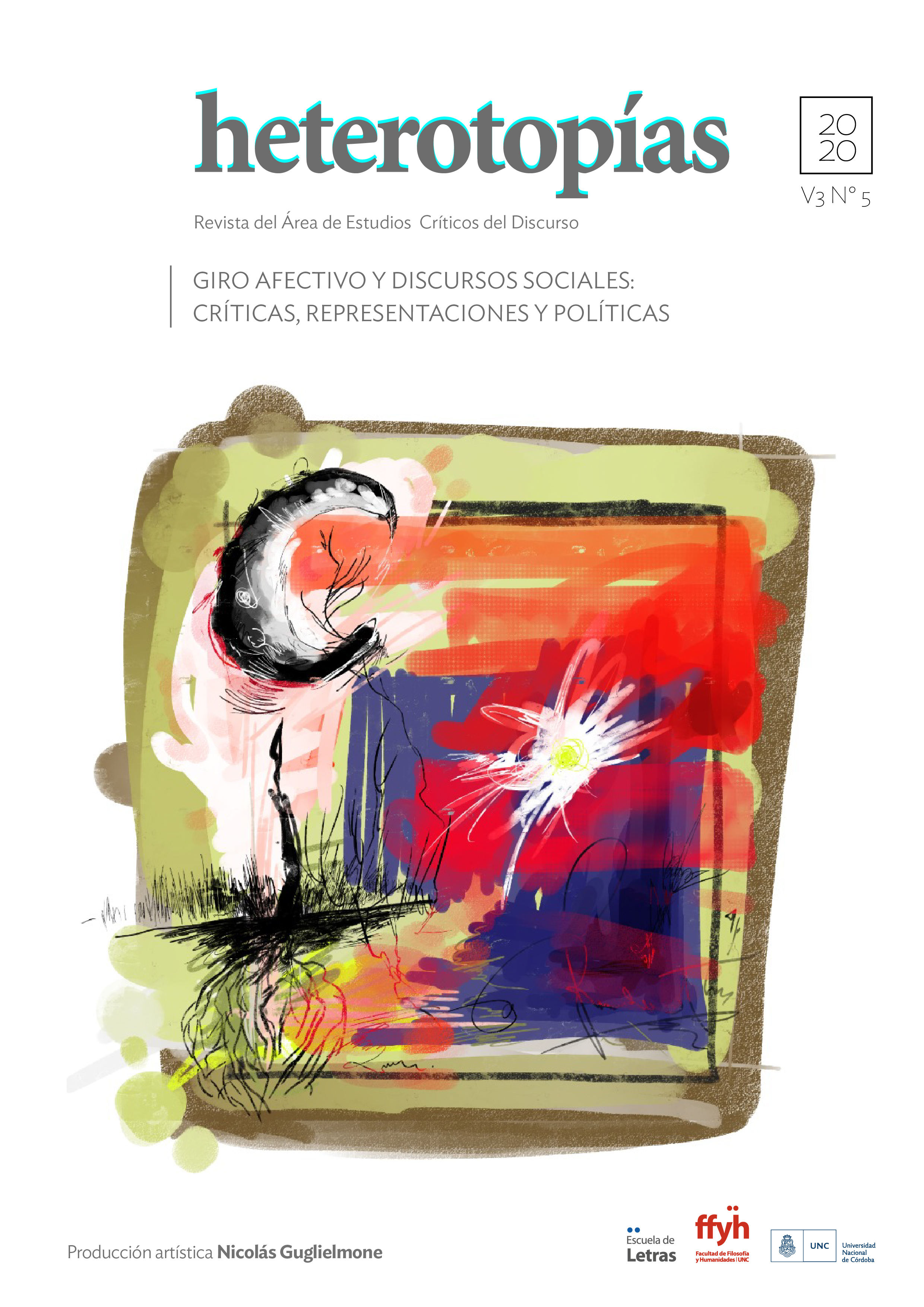"An agenda of rights, what agenda of affection is it?" Interview with val flores
Main Article Content
Abstract
Victoria Dahbar (kolo) and Eduardo Mattio interview the activist writer Val Flores from a distance. The exchange took place by email between the city of Córdoba and the city of La Plata, Argentina, in the context of the COVID-19 pandemic. With social confinement as landscape, the conversation revolved around writing as a theoretical and affective practice, the affective disputes in the agendas of sexual dissidence, the emotional pedagogies that intersect and can intersect the CSE (Comprehensive Sexual Education), and the power of disenchantment as a feminist politics of interruption.
Downloads
Article Details

This work is licensed under a Creative Commons Attribution-NonCommercial-ShareAlike 4.0 International License.
Those authors who have publications with this journal, accept the following terms: Those authors who have publications with this journal, accept the following terms:
a. The authors will keep their copyright and guarantee to the journal the right of first publication of their work, which will be simultaneously subject to the Creative Commons Attribution - Non-Commercial - Share Alike (by-nc-sa) Attribution License; no commercial use of the original work or any derivative works is allowed, the distribution of which must be done with a license equal to the one that regulates the original work.
b. Authors may adopt other non-exclusive license agreements for the distribution of the published version of the work (e.g., deposit it in an institutional telematic archive or publish it in a monographic volume) provided that the initial publication in this journal is indicated.
c. Authors are allowed and recommended to disseminate their work through the Internet (e.g. in institutional telematic archives or on their website) before and during the submission process, which may lead to interesting exchanges and increase the number of citations of the published work. (See The effect of open access).
References
Cvetkovich, A. (2018). Un archivo de sentimientos. Trauma, sexualidad y culturas públicas lesbianas. Trad. Javier Sáez. Madrid: Bellaterra.
flores, v. (2014). Desmontar la lengua del mandato, criar la lengua del desacato. Diálogo transfronterizo con tomás henríquez murgas y jorge díaz fuentes. Santiago de Chile: Mantis.
flores, v. (2018a). El derecho al gemido. Notas para pensar la ESI desde una posición prosexo. Revista Mora. Dossier “La ESI ¿es feminista?: Encuentros y desencuentros entre una política pública y los modos feministas de pensar la política, 25, 1-9. Recuperado de http://genero.institutos.filo.uba.ar/debate-revista-mora-n%C2%B025-2018.
flores, v. (2018b). Ella, no. 57 laconismos postapocalípticos (o la masacre de una lesbiana eremita). La Plata: Exiliadas.
flores, v. (2018c). Esporas de indisciplina. Pedagogías trastornadas y metodologías queer. En AA.VV. Pedagogías transgresoras II (pp. 139-208). Santo Tomé: Bocavulvaria.
flores, v. (2018d). Febriles alquimias del cuerpo. Una poética excrementicia. Revista Pléyade. Dossier “Los nombres del feminismo”, 22, 45-60. Recuperado de http://www.revistapleyade.cl/wp-content/uploads/3.-flores_Feriles-alquimias-del-cuerpo.pdf.
flores, v. (2020). Cuarentenario con val flores. Librería La libre. Recuperado de https://lalibre.com.ar/2020/04/09/cuarentenario-con-val-flores/.
Glissant, E. (2006). Tratado del Todo-Mundo. Trad. María Teresa Gallego Urrutia. Barcelona: El Cobre.
Halberstam, J. (2018a). El arte queer del fracaso. Trad. de Javier Sáez. Madrid: Egales.
Halberstam, J. (2018b). Trans*. Una guía rápida y peculiar de la variabilidad de género. Trad. de Javier Sáez. Madrid: Egales.
Hartman, S. (s/f). Venus en dos actos. Hemispheric Institute. Recuperado de https://hemisphericinstitute.org/en/emisferica-91/9-1-essays/venus-en-dos-actos.html.
Luhmann, S. (2018). ¿Cuirizar/Cuestionar la pedagogía? o, La pedagogía es una cosa bastante cuir. Trad. Gabriela Adelstein. En AA.VV. Pedagogías transgresoras II (pp. 39-66). Santo Tomé: Bocavulvaria.
Nelson, M. (2018). Los argonautas. Madrid: Tres puntos.
Rogoff, I. (2003). Del criticismo a la crítica y a la criticabilidad. Trad. de Marcelo Expósito. Recuperado de http://eipcp.net/transversal/0806/rogoff1/sp.
Sedgwick, E.K. (1999). Performatividad queer. The art of the novel de Henry James. Trad. Víctor Manuel Rodríguez. Revista Nómadas, 10, 198-214. Recuperado de https://www.redalyc.org/pdf/1051/105114274017.pdf.
Sedgwick, E.K. (2018). Tocar la fibra. Afecto, pedagogía, performatividad. Madrid: Alpuerto.
Spivak, G. (2012). An aesthetic education in the era of globalization. Cambridge, MA: Harvard University Press.
Spivak, G. (2013). Todas las libertades que se conceden dentro de una democracia tienen que estar ligadas a cuestiones y causas para que esas libertades puedan ser ejercidas. El jinete insomne. Recuperado de http://eljineteinsomne2.blogspot.com/2013/11/gayatri-spivak-todas-las-libertades-que.html.
